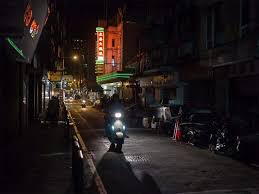As much of the country enforced power cuts Wednesday to fulfill state conservation objectives and ease shortages in some places, people in northeastern China ate breakfast by the light of their cellphones while merchants turned on generators.
According to news reports, high coal prices are causing power firms to be hesitant to satisfy soaring demand, but economists argue the underlying reason is political: officials are under pressure to reduce energy consumption in order to reach government targets.
After hearing a notice that power will be turned off at 7:30 a.m. in Shenyang, the northeast’s most populous city, restaurant owner Li Yufeng used a battery from an electric bicycle to operate a pot for noodles. Li said he arrived two hours early for work, around 6 a.m., to cook chicken, sauces, and other items.
As diners ate by the light of their smartphones, Li observed, “There are some repercussions, but not a significant impact.”
Factories in China’s busiest manufacturing areas have been told to shut down for up to a week, raising fears that global supplies of smartphones and other items would be interrupted. Urban areas are now being blacked out, prompting social media requests for the government to address the issue.
China’s electricity consumption is nearly double, despite the Communist Party’s efforts to lower energy intensity or the amount of energy utilized per unit of economic production.
The power outages occur as world leaders prepare to participate in a United Nations environmental summit via video link on Oct. 12-13 in Kunming, China’s southwestern metropolis. As the meeting’s host, President Xi Jinping’s government will be under even more pressure to demonstrate compliance with emissions and energy efficiency standards.
According to Lara Dong of IHS Markit, the cuts are “largely driven by energy consumption reduction measures, with power shortages affecting a few other provinces.”
She stated, “This is in accordance with China’s decarbonization aspirations.”
After manufacturing recovered from the epidemic, the Cabinet’s planning office warned in August that 20 regions had exceeded energy use and pollution targets. Failure to satisfy the government’s lofty ambitions to make the economy greener and more energy-efficient can be a career-ending gaffe.
According to research by Bank of America, the power outages “may be more disruptive than prior shortages.” “A relaxation of the government’s energy consumption goals may not immediately alleviate the power crunch,” it warned, citing shortages in some locations.
China is one of the world’s largest emitters of greenhouse gases and consumes more energy per unit of economic output than developed countries. Given its large population, it rates substantially lower on a per capita basis.
China is also preparing for the Winter Olympics, which will be held in the capital, Beijing, and the nearby city of Shijiazhuang in February, during which pure blue skies will be required.
Officials in Jiangsu province, northwest of Shanghai, informed state media that some cities in the region have used up 90 percent of this year’s electricity quota. Individual local governments must decide how to meet their targets, according to authorities from the provincial planning office.
The administration of Guangdong province, China’s largest manufacturing center, has cited both statutory energy use limits and low water levels in hydropower reservoirs that supply a large portion of the region’s electricity as reasons for the shortage.
Power demand in Liaoning province, where Shenyang is the capital, reached a new high in the first eight months of the year, according to the administration. Liaoning has been experiencing shortages since then, according to the report, due to a drop in wind power and other sources.
The scarcity of coal was blamed by the administration of neighboring Jilin province. It stated in a statement on Monday that its governor would travel to Inner Mongolia to meet with miners to secure additional supplies.
Residents in Shenyang and other places were warned ahead of time that power would be stopped, but no reason was given.
The proprietor of a noodle shop, Li, gave a reporter a social media notification announcing that power will be off in his neighborhood from 7:30 a.m. until 4:30 p.m.
Yang Chang, the shopkeeper, had a generator running on the pavement to keep the meat freezers cold.
“Unlike restaurants, we can sell products as long as there is electricity,” Yang explained. Yang didn’t know or care why the power was out, but he did say, “It’s understandable.”
“I was born in the 1990s,” she says. “Electricity wasn’t stable when I was a kid,” Yang explained. “The government will find a solution, notwithstanding our difficulties.”

















